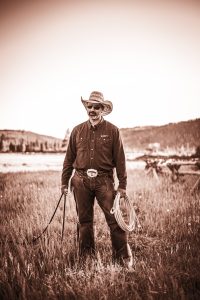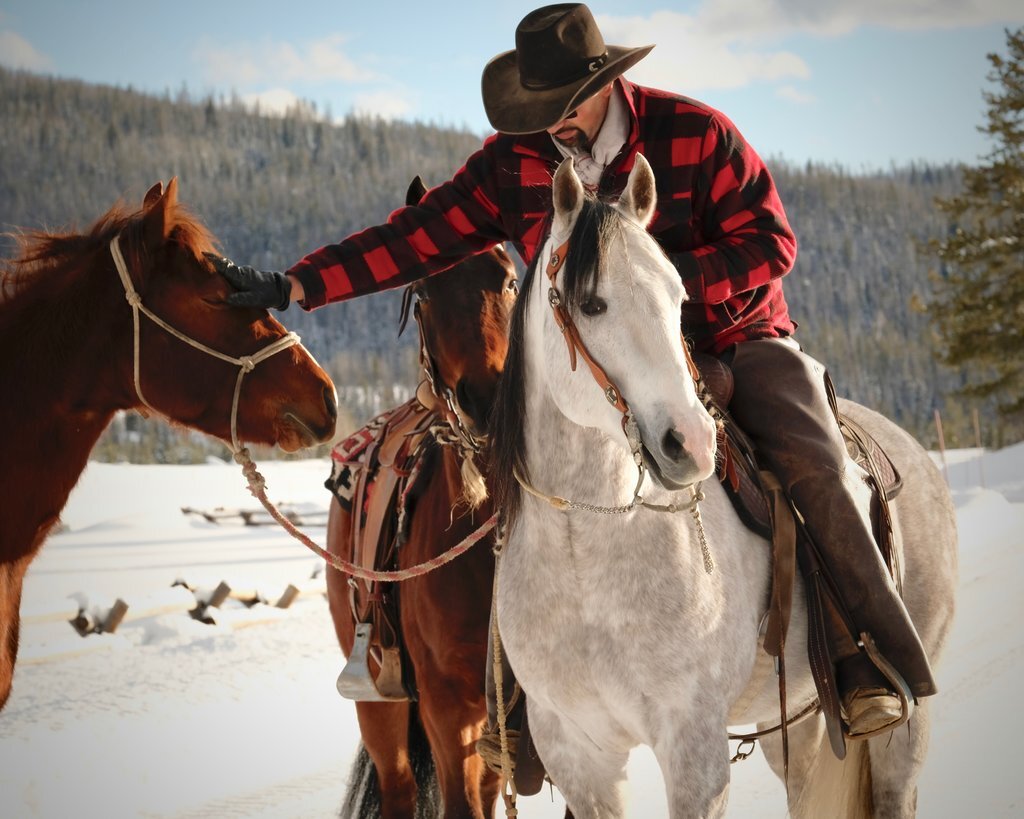Every wrangler brings a unique story to the saddle. KP, our Director of Horse Operations, shares his special connection to the centuries-old Paniolo tradition of Hawai‘i – a heritage defined by patience, respect, and deep partnership with the horse. His roots run through the red dirt of the islands and the open ranges of the American West, blending two cultures that honor the quiet wisdom of the horse.
“When you’re able to feel your horse, they can feel you in the same way—both physically and spiritually.”
 The Paniolo tradition in Hawai‘i dates back centuries. What values or practices from that heritage do you carry with you in your work today?
The Paniolo tradition in Hawai‘i dates back centuries. What values or practices from that heritage do you carry with you in your work today?
Ho‘o ponopono means “to make what is wrong right again.” I bring that philosophy into my horsemanship every day—not just from the human perspective, but from the horse’s point of view as well. Horses don’t lie; what you see is what you get. Many carry “baggage” from past experiences, and part of my role is to help them release it. I try to let each horse tell me their story, and from that moment on, the process of ho‘o pono pono begins—helping reshape and heal the horse through understanding and patience.
Ha‘ola, the “breath of life,” reminds me that every living being carries value and energy. There’s a physical and spiritual awareness to this; an understanding that harmony exists when both horse and rider can feel one another. When that connection happens, training becomes more than mechanics. It becomes a shared rhythm, grounded in respect and trust.
As I’ve grown older, I’ve also come to deeply appreciate the classical vaquero style of riding and training. It was the vaqueros who first came to Hawai‘i to teach the Hawaiians how to cowboy, which is a legacy that continues to guide me in my own horsemanship journey.
How does the Paniolo way of working with horses and cattle compare to what we see in the American West, and how do you bring those influences together here at Vista Verde Ranch?
The Paniolo and Western traditions share a deep respect for the horse, but the paniolo style often reflects the old vaquero way; slow, steady, and patient. It’s about giving the horse time to learn, to understand pressure and release, and to discover the right answer on their own. At Vista Verde, I blend that Hawaiian patience and mindfulness with the practical skills and traditions of the American West, which I like to think creates a bridge between cultures that honors both ways of life.
What lessons from Paniolo horsemanship do you think resonate most with guests when they’re riding or working with horses at the Ranch?
Ho‘o ponopono—the practice of making things right—is one of the most meaningful lessons guests take away. Horses, like people, make mistakes, but holding a grudge doesn’t serve anyone. Every ride is an opportunity to start fresh, to listen, and to build trust. That mindset transforms not only how we ride, but how we approach relationships in everyday life.
In leading the horse program, how do you weave your paniolo background into the guest experience so they feel a sense of that history and culture?
Storytelling is a huge part of my horsemanship. My father was a wonderful storyteller, and I learned that stories carry wisdom in a way that instruction alone can’t. Whether I’m talking about a lesson learned from a horse or sharing an old paniolo tale, those stories help guests connect more deeply with the horses, with the culture, and with themselves.
What excites you most about sharing your Paniolo roots with guests in Colorado, and how does it deepen the unique character of Vista Verde Ranch?
For me, it’s the connection between what I do here and what I grew up doing as a young Paniolo. Every day with horses is a chance to learn about them and about ourselves. Being able to share that philosophy with guests, to help them find both joy and growth through horsemanship, is what excites me most. It’s part of what makes Vista Verde so special. It’s a place where tradition and learning come together in the saddle.
At Vista Verde, horsemanship is more than skill; it’s a story passed from hand to hand, rein to rein. Whether it’s through the rhythm of the ride or the quiet wisdom of a horse, our guests can discover that the lessons of the Paniolo live in the heart of Colorado’s high country. Learn more about the history and preservation of the Paniolo traditions here.

